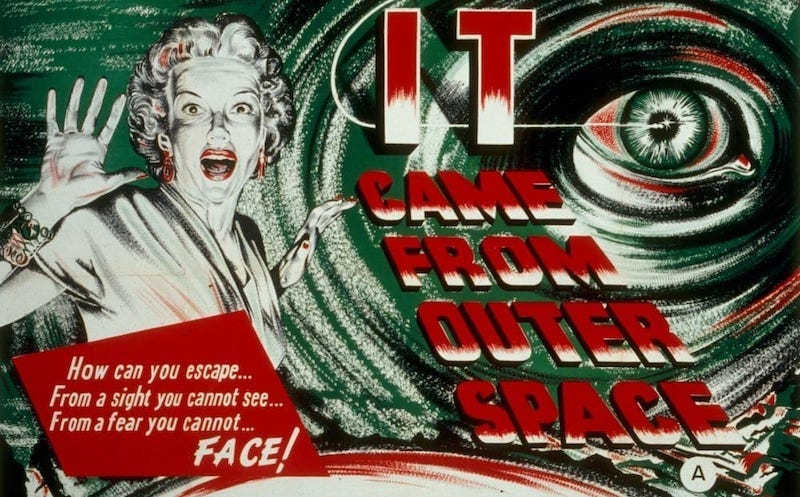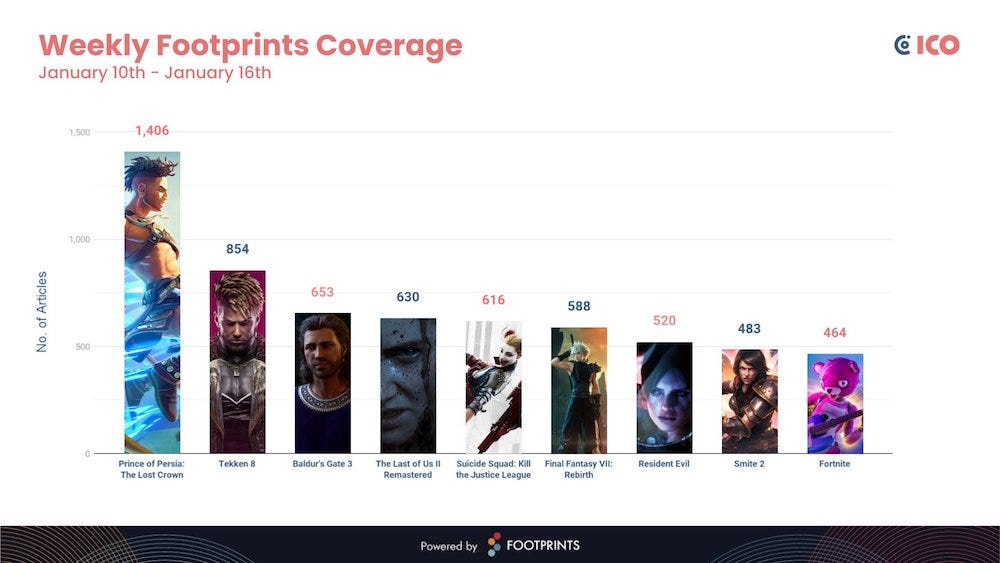Is the latest game subscription 'moral panic' justified?
Also: lots more discovery and platform news, naturally...
[The GameDiscoverCo game discovery newsletter is written by ‘how people find your game’ expert & company founder Simon Carless, and is a regular look at how people discover and buy video games in the 2020s.]
Well, today’s GameDiscoverCo newsletter was planned out meticulously. But it got sideswiped into a ditch by the ‘B story’ about game subscriptions, which turned out to be way more interesting - and long-winded - than we thought.
We’ve called for the ‘newsletter subject’ recovery vehicle, but… no luck? So while we turn on the heating, just a side note that for those attending DICE 2024 in Las Vegas next month, I’ll be leading a couple of roundtables on ‘Launching New Games in a World with Lots of Popular Old Ones’ - an evergreen topic. See ya there!
[REMINDER: our upgraded Plus game data suite is here - you can subscribe to Plus now to get full access to it, weekly PC/console sales research, an exclusive Discord, seven (!) detailed game discovery eBooks - & lots more. Check out this newsletter for details on new features.]
On Baldur’s Gate 3, game subscriptions & fears...

For today’s lead, we wanted to highlight an interesting Twitter thread from Larian’s head Swen Vincke, who’s already been loud about Baldur’s Gate 3 not going into a game subscription service.
The background: Ubisoft+ subscription plans have changed, with a $18/month tier, Ubisoft+ Premium “offering day-one new releases and early access”, and Ubisoft+ Classics at $8/month. (The higher tier may be where the newly licensed Activision-Blizzard cloud games land, we’re guessing? Which will be very interesting indeed…)
Along the way, Ubisoft’s subscriptions exec talked about how the “consumer shift” of people not owning games any more “needs to happen”, which irked some hardcore gamers. And replying to an IGN Tweet about “what needs to happen before subscription services become a more significant slice of the video game business”, Vincke said:
“Whatever the future of games looks like, content will always be king. But it’s going to be a lot harder to get good content if subscription becomes the dominant model and a select group gets to decide what goes to market and what not. Direct from developer to players is the way….
We are already all dependent on a select group of digital distribution platforms and discoverability is brutal. Should those platforms all switch to subscription, it’ll become savage.”
For Swen, subscription services (Game Pass, PS+, Apple Arcade) - besides gatekeeping - are also too calculating: “Getting a board to OK a project fueled by idealism is almost impossible and idealism needs room to exist, even if it can lead to disaster. Subscription models will always end up being cost/benefit analysis exercises intended to maximize profit.”
Oddly, contrasting with Sony’s more conservative approach with PS+, we think that sub services like Game Pass sometimes get used as a ‘sinkhole’ for costs on interesting & creative first-party games that might otherwise not get made (ahem, Pentiment). That’s the opposite of what Swen is saying on ‘idealism’ not being allowed to exist.*
(*Although you need to be owned by Microsoft to take full advantage of this. And perhaps the cost-benefit analysis on those platforms is still in progress - Apple Arcade has been through it.)
And in an indirect riposte to Vincke, Circana’s Mat Piscatella points out: “Subscription growth has flattened, and sub services on console and PC platforms accounts for only 10% of total video game content spending in the US. I get that some people want to protect their preferred model, but the idea that subs will become dominant is unsupported by data.” (Agree.)
And yes, Piscatella’s belief that “subs have been more additive than cannibalistic, and offer players, devs and pubs more choice in how to play or how to go to market” is likely true. When sub services work for certain third-party games, they really work. The most agile, upscaled IAP-additive titles (like Grand Theft Auto V/Online) swing in and out of GP/PS+ without a care in the world, grabbing extra reach every time.
But it’s also possible that there's dollars spent, and then markets disrupted. Who is getting the old and new dollars? Do you need to go ask a gatekeeping third-party sub service for the dollars, rather than being able to access them directly? (Even if those dollars haven’t ‘shifted’ very linearly from direct to subscription - which they haven’t.)
The three key ‘direct to market’ game factors…
So what’s the conclusion? Well, the market is changing, and both ‘there’s too many games!’ and the rise of subscription services are part of that. (For us, the former is the bigger factor, and the latter is the smaller one.)
And sure, services like Apple Arcade and Xbox/PC Game Pass are pushing players’ mental boundaries - intentionally or not - of ‘you can play so many games with us - why buy new ones?’ But they’re not the principal reason why the market is tough, especially on PC*. And they also curate good games & can provide opportunity and upside for devs and publishers.
(*Although Microsoft would love to disrupt Steam with PC Game Pass, it doesn’t seem to have majorly happened yet - partly because console players were used to paying monthly for multiplayer access, and PC gamers have had no such ‘pay $ monthly’ heritage.)
Overall, the ‘direct to market’* safety valve for games is three-fold and vibrant, and quite different to films/TV, where intermediaries (Netflix, Disney+, even traditional cable networks) dominate, partly due to the high minimum cost of making that media:
On the high end, you have deep, complex Games As A Service (GaaS) titles that can support their own ecosystems and monetize within them. (Think Dead By Daylight, etc.)
On the low end, you have self-funded viral hits from small devs that go direct-to-market. (Think Vampire Survivors, etc - we’ll be featuring one of those in next Monday’s newsletter, actually!)
Underpinning everything is a big chunk of gamers wanting to 100% own their game catalogs, not ‘rent’ them - the approach still encouraged by Steam and a majority of other platforms.
(*When we’re saying ‘direct to market’ here, it’s via a digital store taking a 30% cut. So it’s not completely direct - unless you’re Escape From Tarkov. But it’s much more direct - and upside OR downside centric - than ‘intermediary pays fixed sum to distribute your content’.)
The vibrancy of these three areas of the ‘direct market’ provides enough of a bulwark to subscription services that we agree, they just can’t dominate (at least in spending!) long-term.
But it’s the gap between the high end and the low end of the ‘direct market’ - slightly exacerbated by the ease of accessing so many great ‘mid-tier’ games via subscriptions - that is where things are messy.
That absolutely affects spending for big, complex ‘pay once’ games like CRPGs (hi, Baldur’s Gate 3!) going forward. And although Vincke’s company swung for the fences and hit a giant home run, that’s just not easy in today’s market.
So it’s reasonable for him to question subscription services that want to include giant ‘pay once’ games (like Starfield!) Where does that end? Not in the market shrinking, no, but potentially in the ‘market balance’ shifting. It’s… complicated.
The game discovery news round-up..

Finishing up the free newsletters for this week, here’s the notable game discovery and platform news we’ve spotted recently. There’s quite a bit:
The U.S. Supreme Court “has denied a request to hear an antitrust dispute between Apple and Fortnite publisher Epic Games. It rejected two petitions, one from each company… leaving the case largely, but not entirely, a win for Apple.” So you can now redirect players outside Apple’s store - if you pay Apple 27%, and your players click through a scary warning screen, lol.
China watcher Daniel Camilo wrote something about Hogwarts Legacy’s gray-market popularity in China, & we contributed some rough estimates: “Just over 500,000 PlayStation units of Hogwarts Legacy were played in Hong Kong/China, and somewhere around 500-600,000 Steam units. (And, uh, about 25,000 Xbox units!).”
Game Conference Guide did a ‘year in review’ of game events in 2023: “Total number of events in 2023: 307 (up 5.5%)… the biggest number of events originated from the EU (54%) followed by North America (28%)… median duration of a single event was 2 days (same as in 2022), average duration was 2.7 days.”
Microlinks: video game hardware sales were up 42% year on year in Europe, partly due to PS5 supply improvements; Square Enix’s Splatoon-y Foamstars is doing a ‘PlayStation Plus Essential Day 1’ launch in Feb, another multiplayer title using subscription services for initial scale; MSI’s Claw is a new $699 Steam Deck ‘portable PC’ rival using Windows and a new Intel chip.
The Game Developers Choice Awards have announced their nominees, “led by The Legend of Zelda: Tears of the Kingdom and Baldur’s Gate 3” with 7 nominations each. Next up: Cocoon (5 noms), and “the other titles in the Game of the Year category include Dave the Diver, Dredge, and Marvel’s Spider-Man 2.” (No Alan Wake II, but it did get Narrative, Tech and Art noms.)
Would you like to see all Steam’s ‘news pop-up’ images in one place, to analyze the art and which offers appeared? Of course you would, and SteamDB has a page dedicated to that - and a slightly more well-known one for ‘front page takeover ads’. (This has been around for a while, but we only just re-remembered it.)
Is Scopely’s breakout mobile hit Monopoly GO actually profitable after paid UA (user acquisition)? Matej Lancaric & Joseph Kim don’t really know (and can’t know!) But they make some good arguments that growth has been prioritized over profit or ROI for the high-profile Saudi-backed studio.
Looking at the next tranche of Xbox Game Pass debuts, there’s some good stuff in here - ‘survival base builder x Pokemon’ Palworld, hit Vampire Survivors-like Brotato, and the latest Formula 1 game from EA (coming to Game Pass Ultimate and PC Game Pass - but not base Xbox Game Pass cos of EA Play, complicatedly.)
This excellent long-form read on the state of user-generated content covers both Roblox’s discovery diversification (“38% of the top 1,000 experiences were created in the last 12 months”) & post-Big Bang era Fortnite: “Fortnite Battle Royale continues to be too sticky, so it and the associated practice maps are drawing in the majority of additional engagement.”
Microlinks: Paradox is upping the cost of its Hearts Of Iron IV Steam ‘DLC subscription’ from $5 to $8 per month; Netflix is done with the Bandersnatch-style ‘interactive TV show’ format; there’s reports that Blizzard may re-team with NetEase in China after a rough Kotick-era ‘divorce’ - not 100% confirmed, tho.
Finally, we hadn’t checked out Billy Goh’s ‘collages of classic 2D games’ Twitter account in a hot minute, and returned to discover this fun piece made of “over 100 ‘dizzy’ icons from various fighting games” - lots of little birdies in here:
[We’re GameDiscoverCo, an agency based around one simple issue: how do players find, buy and enjoy your PC or console game? We run the newsletter you’re reading, and provide consulting services for publishers, funds, and other smart game industry folks.]

